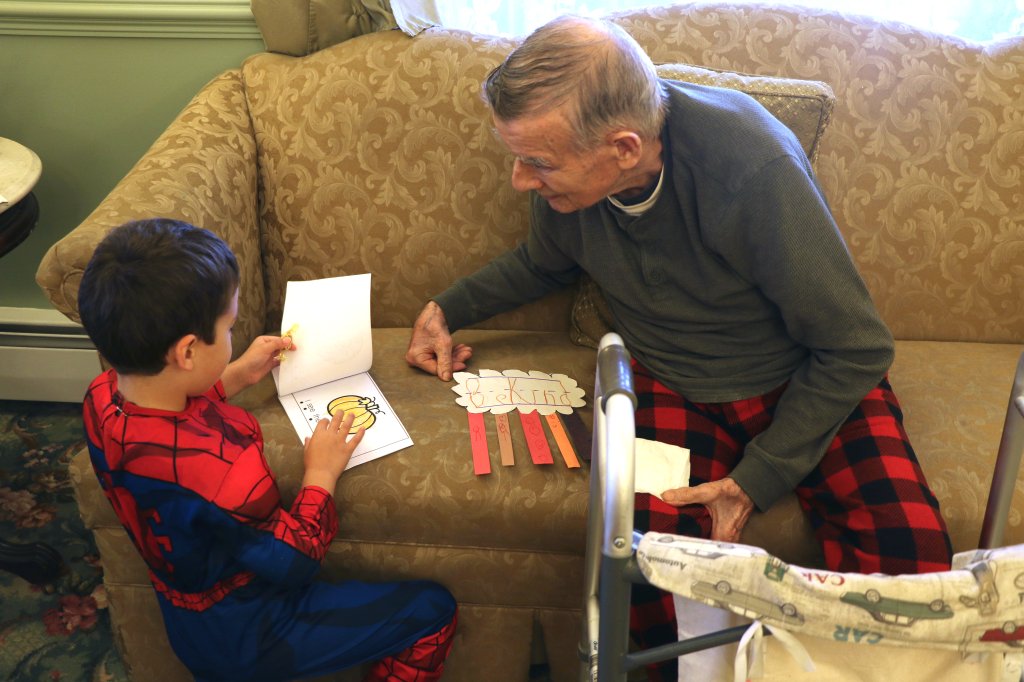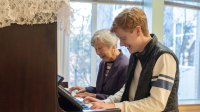Bringing the Benefits of Intergenerational Learning to School
Collaborating with a local senior center in areas across the curriculum can enrich lessons and boost students’ social and emotional skills.
Your content has been saved!
Go to My Saved Content.Research has shown that both older adults and young people benefit from intergenerational relationships. These interactions promote mental and emotional wellness and a sense of purpose.
Educational partnerships between K–12 schools and senior centers or homes can offer a host of benefits for students, teachers, and the elders. There are endless opportunities for students in all subject areas. The following are some examples categorized by varying disciplines. Be sure to check in with the staff beforehand about which activities the elders are able to join.
Connecting across subject areas
English language arts: Invite the elders to participate in book clubs—they can read the same texts that students are reading and then meet together to discuss and exchange perspectives and responses to the book. Here are some other ideas:

- Welcome elders and students to read aloud to one another.
- Host a poetry reading and invite elders to share poetry that they like or have written, or have students read their own poetry aloud.
- Have conversation practice through small talk or with a prepared list of questions. This is especially good for ELL students.
Physical education: Depending on regulations and other factors, students might be able to participate in a light exercise class with elders. Afterward, they can have a discussion on how and why health and physical activity is a lifelong benefit, brainstorm ways of continuing physical activity through adulthood, and talk about what types of activities are appropriate for varying stages of life.
An alternative would be to have conversations with elders about what sports or other physical activities they enjoyed participating in or watching, and whether they still participate in or follow that activity.
World languages: Students can write bilingual cards and send them to elders or prepare a short multicultural performance (dance, for example) for the elders. They can partner with elders and give a one-on-one or small group tutoring session to teach the elders some words in a new language. This is especially useful for students who may be interested in studying education in the future.
Digital design or photography: Ask family members of elders with dementia to send a photo of the front door from their homes, and using a printer that makes custom-size posters, have students enlarge the photos, which can be placed on the bedroom door of these elders to give them a sense of familiarity.
If possible, collect photos from the elders’ childhood or youth; students can then make creative visual displays using these images to be placed in bedrooms and hallways.
Art: Students set up art exhibits of varying media at the senior center or nursing home. They can also lead art workshops, with each student assigned a different role—a couple of students leading, other students partnering with elders to communicate about the art process during the class. Advanced students can paint a small mural.
Have students create cards or any sort of creative visual project that can be shared and displayed or gift wrapped and sent to elders as a gift for holidays. Collect ideas for visuals to include on personalized cards or handmade gifts to incorporate the interests of the elders (e.g., one woman loves the Yankees, so a student includes the Yankees’ logo on a handmade greeting card). Students make art objects that can be used as fidgets, objects used for relaxation or meditation, or for exercise therapy.
Music: Students can give concerts in the form of short recitals, solo or in small ensemble performances. Ask the elders to send song requests, so that students can perform them if possible. Or the staff can ask the families of dementia patients for a list of the patient’s favorite songs or songs that were popular in their youth, and students can perform these or bring recordings of the songs.
History: Coordinate visits so that students have conversations or interviews with the elders related to any topic in history class. Seek out veterans of war, retirees from various industries related to the curriculum, elders who have an interest in and knowledge of particular historical subjects. Students might also write letters of appreciation to veterans. As a class, students can prepare a list of questions related to a subject they’re studying and send it to the home to collect answers from the elders.
Here are a few examples: What was our hometown like when you were a child? Tell us about a typical day when you were in elementary school. What did most students do after they graduated from (our hometown) high school? And so on.
Math: Bring a statistics class to circulate around a group of elders to ask teacher-approved survey questions and collect data. Analyze the data and draw conclusions in a report to present to the class.
Construction, shop, or technology class: Design and build objects to donate to the center or residence—furniture, birdhouses. Brainstorm with the staff about the elders’ needs and how construction students might be able to build something meaningful.
Film: Conduct interviews and videotape these to create a collection of local history films. Have a showing of the video if permitted by privacy and other considerations.
There are many ways in which students can meet and collaborate with individuals in elder care in their local communities. The extensive knowledge and collective wisdom of many older people is often overlooked or brushed aside in favor of fast-paced technologies and interconnectivity through social media, but these communities can provide great resources and experience in live human-to-human interaction. They also provide opportunities for youth that would otherwise be lost as they grow older themselves. Equally, the elders involved will often find joy and personal rejuvenation in these defined meetings and visits.
No matter the discipline, topic, or media, intergenerational encounters and collaborations are rich and rewarding experiences from which all those involved will benefit.
